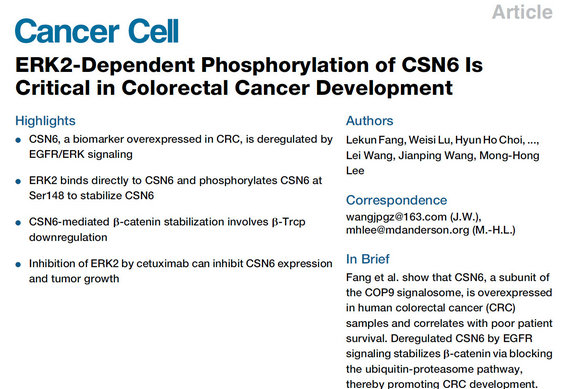Discovery of new biomarker and potential target for precision therapy in colorectal cancer by Prof. Jianping Wang’s team from The Sixth Affiliated Hospital of Sun Yat-sen University
Source: The Sixth Affiliated Hospital of Sun Yat-sen University
Written by: Wenbo Luo
Edited by: Wang Dongmei
On August 10th, 2015, Prof. Jianping Wang’s team in Guangdong Key Laboratory of Colorectal and Pelvic Floor Disease and Department of Colorectal Surgery at The Sixth Affiliated Hospital of Sun Yat-sen University, collaborating with Prof. Mong-Hong Lee from the University of Texas MD Anderson Cancer Center, published their remarkable research finding on the international top journal of oncology Cancer Cell (IF:23.523). Note: The Sixth Affiliated Hospital of Sun Yat-sen University shares both the first-author and corresponding-author affiliations. This study has found a new biomarker and potential target for precision therapy in colorectal cancer, offering a new direction for future colorectal cancer therapy.

Remarkable progress in colorectal cancer research published on Cancel Cell
After 4 years’ continuous effort and with the guidance from Prof. Jianping Wang and Prof. Mong-Hong Lee, the current Associate Professor Lekun Fang first time discovered an oncogene named CSN6 and its vital role in ubiquitination regulation during colorectal cancer progression. It is worth to note that both first authors, Dr. Lekun Fang and Dr. Weisi Lu, are from the post-1985 generation. And Prof. Mong-Hong Lee, co-corresponding author, is going to join the research team of The Sixth Affiliated Hospital of Sun Yat-sen University for full time in 2015. Prof. Lee has been dedicated to the study of cancer progression and signaling transduction, and he is planning to focus on illustrating the mechanism of colorectal cancer development and potential biomarkers in the near future.
In this Cancer Cell paper, the authors demonstrate the molecular mechanism of the oncogene CSN6 in regulating ubiquitination. In other words, CSN6 is a biomarker highly expressed in tissues from colorectal cancer patients, which is also strongly correlated with the prognosis of colorectal cancer. Moreover, CSN6 locates at the downstream of the signal pathways of current target therapy, therefore, targeting CSN6 helps to increase the specificity of current drug therapy in colorectal cancer. Protein degradation mediated by ubiquitination is related to various biological process, including inflammatory reaction, autophagy, DNA repair and enzyme activity, etc. Moreover, ubiquitination plays an important role in tumor progression. "CSN6 is regulated through signaling pathways called EGFR and ERK. When CSN6 is overexpressed via ERK2 in particular, however, it can lead to deregulation of another protein, beta-catenin, a transcription factor known to be linked to cancer development,” said Professor Mong-Hong Lee. “We further defined the mechanism by which beta-catenin is regulated in this cancer.”
From raising questions from clinical observations, to carrying out research studies and finally back to clinical application, the joint research team from China and USA brought fully respective advantages and cooperated to uncover the mechanism of colorectal cancer development, and provide an addition solution for precision medicine. The importance of CSN6, which is capable of degrading the degrader and to promote Wnt signaling, has not only been recognized by Cancer Cell, but also been highlighted lately in the editor’s choice section of Science Signaling (IF:6.279). The results of this study also provide a solid foundation for further detailed mechanisms of CSN6 and drug discovery specifically targeting CSN6.